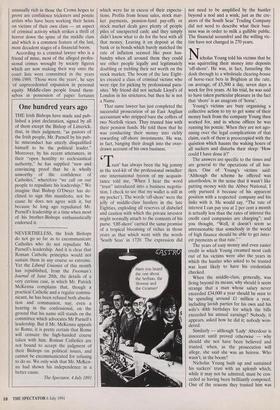One hundred years ago
THE Irish Bishops have made and pub- lished a joint declaration, signed by all of them except the Bishop of Limerick, that, in their judgment, "as pastors of the Irish people, Mr. Parnell by his pub- lic misconduct has utterly disqualified himself to be the political leader." Moreover, by his recent utterances, in their "open hostility to ecclesiastical authority," he has supplied "new and convincing proof that he is wholly unworthy of the confidence of Catholics," wherefore "we call on our people to repudiate his leadership." We imagine that Bishop O'Dwyer has de- clined to sign this manifesto, not be- cause he does not agree with it, but because he long ago repudiated Mr. Parnell's leadership at a time when most of his brother-Bishops enthusiastically endorsed it.
NEVERTHELESS, the Irish Bishops do not go so far as to excommunicate Catholics who do not repudiate Mr. Parnell's leadership. And it is clear that Roman Catholic principles would not sustain them in any course so extreme. Yet the Liberal Unionist of this month has republished, from the Freeman's Journal of June 20th, the details of a very curious case, in which Mr. Patrick McKenna complains that, though a practical Catholic and a regular commu- nicant, he has been refused both absolu- tion and communion, nay, even a hearing in the confessional, on the ground that his name still stands on the committee which advocates Mr Parnell's leadership. But if Mr. McKenna appeals to Rome, it is pretty certain that Rome will censure the high-handed course taken with him. Roman Catholics are not bound to accept the judgment of their Bishops on political issues, and cannot be excommunicated for refusing to do so. We only wish that Mr. McKen- na had shown his independence in a better cause.
The Spectator, 4 July 1891


















































 Previous page
Previous page